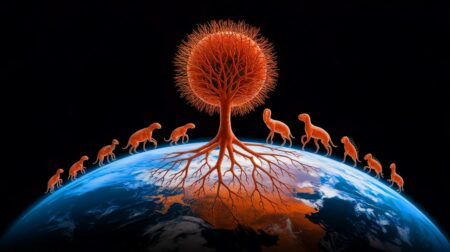Watching nature documentaries is a favorite pastime for those of us who love nature with all its wonders, but doing so could have benefits for the planet itself.
That is because people who enjoy watching documentaries on the natural world can become more interested in plants with a deepening involvement in botany and ecology as a result. This change in attitude could help save the 40% of plant species that are under threat globally.
So say a team of scientists from the United Kingdom and Ireland who authored a study on how nature documentaries promote awareness of plants and the risks facing them.
“Plants that are not directly useful to humans are particularly vulnerable. People often do not recognize how important many plants are due to a cognitive bias sometimes called ‘plant blindness’ or ‘plant awareness disparity,'” the scientists explain.
“While humans are generally concerned with endangered animals, threats to plants are harder to recognize and address. In the United States, for example, plants receive less than 4% of federal funding for endangered species, despite comprising 57% of the endangered species list,” they elucidate.
Although it is a tall order to draw a clear link between popular nature documentaries and increased involvement in conservation efforts, the scientists acknowledge, these TV shows can engage people en masse by familiarizing them with the natural world..
The scientist focused specifically on Green Planet, a documentary released by the BBC in 2022 with narration provided by British conservantionist and television producer David Attenborough.
The show, which had five episodes and reached an audience of nearly 5 million people in the United Kingdom alone, featured a diversity of plant species in a variety of environments from tropical rainforests to seasonal lands and from deserts to urban spaces. The documentary also addressed environmental concerns such as the dangers of deforestation, invasive monocultures and climate change.
The scientists measured whether the show sparked an interest in plants by viewers based on online behaviors around the time of the broadcast, focusing on Google Trends and Wikipedia page hits for plant species featured on the program before and after episodes featuring them aired.
They found that some 28% of search terms regarding plants mentioned in the documentary reached peak popularity in the country the week after the broadcast of an episode both on Google Trends and Wikipedia. “Almost a third (31.3%) of the Wikipedia pages related to plants mentioned in Green Planet showed increased visits the week after the broadcast,” the scientists say.
“I think that increasing public awareness of plants is essential and fascinating,” explains Joanna Kacprzyk, the paper’s lead author who is an assistant professor at University College Dublin.
“[N]ature documentaries can increase plant awareness among the audience. Our results also suggest that the viewers found certain plant species particularly captivating,” Kacprzyk adds.”These plants could be used for promoting plant conservation efforts and counteracting the alarming loss of plant biodiversity.”
Did you like it? 4.4/5 (30)








